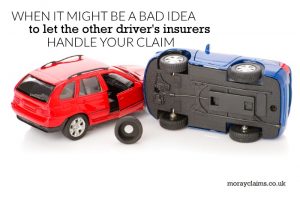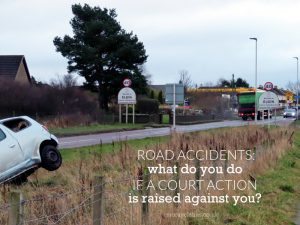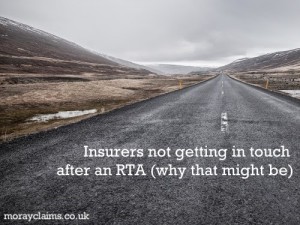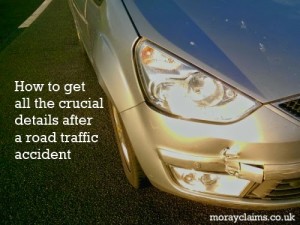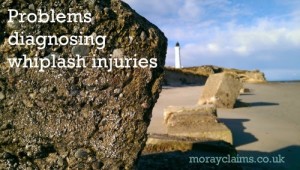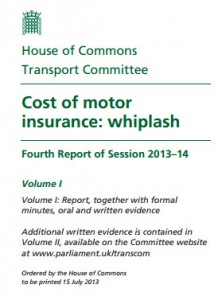An "innocent third party car claim" is how some motor insurers describe what you have if one of their customers has crashed into your vehicle and it’s not your fault. In other words, the motor insurers in question are the third-party insurers, not your own motor insurers. Their customer was to blame for the accident. The third-party insurers’ offer to you is that you should let them take care of you and your vehicle in sorting things out. This help from the other driver's insurer can include: the repair of your vehicle (or a payment to represent its value if it has been written off), use of a hire vehicle, free of charge, while your own vehicle is being repaired; and help if you have been injured – to include treatment/rehabilitation and compensation. But couldn't you deal through your own insurers? If you have comprehensive motor insurance, one of your options is to deal with a claim for damage to your car through your own motor insurers. This can be an involved process. You may Continue Reading
Road Accidents: What To Do If A Court Action Is Raised Against You
We regularly get enquiries from people who have had a court action raised against them following involvement in a road traffic accident. If you are in that situation, what should you do? The typical scenario runs like this … You’ve had an accident with another vehicle when you were driving your car. The accident was your fault. The other vehicle was damaged or written off and the other driver was injured. Hopefully, you had comprehensive insurance and so your own vehicle will have been repaired or replaced by your insurers. They may also have told you they have settled the other party’s claim – by paying for the repair or replacement of their vehicle. Months later, out of the blue, you receive an Initial Writ or Summons (depending on whether the action against you is in the Sheriff Court or the Court of Session). This can be a startling experience, especially if the action is served on you by a Sheriff Officer or Messengers at Arms. The other driver – or maybe a passenger in that Continue Reading
Should I Settle My Accident Injury Claim Directly With The Insurance Company?
If you have been hurt as the result of an accident, it is likely that the third party’s insurance company will contact you directly. You will probably have exchanged personal details with the other party to the accident and that information will be passed on to the other insurers if the accident is reported to them by their customer. Insurers have recognised this as a great opportunity to “get in first”. Where the insurance company for the other party sees that the accident is likely to be the fault of their insured, if they move swiftly, they can get to you before you are in touch with your own insurers. The “prize” as far as they are concerned is the chance to offer money to settle any personal injury claim you might have - before you have had time to get proper legal advice and intimate the claim. Third party capture There are different terms for this procedure, depending on your point of view. Solicitors who represent the interests of injury victims refer to it as Continue Reading
Insurers Not Getting In Touch After An RTA (Why That Might Be)
How long does it take for Insurers to get in touch after a road traffic accident? That’s a question we received recently in the following terms: “I was involved in an RTA two months ago. I have not heard from the insurance company yet. How long does it take for them to get in touch? The accident was not my fault.” A significant collision - with lots of post-accident worries It turns out this accident involved a rear end shunt at a junction. The vehicle was pushed right off the road by the impact. The injured driver who contacted us had been knocked unconscious as a result of the crash. He spent two nights in hospital, was off work for several weeks and lost wages. An incorrect assumption He had been driving his works van and thought that his employers’ motor insurers would take care of his claim for his injuries and his financial losses, including his loss of earnings. This was a classic situation where you, as the accident victim, have suffered injury through no Continue Reading
How To Get All The Crucial Details After A Road Traffic Accident
If you're involved in a RTA, there's crucial information you need to get We were on the main road south. We had not even made it out of Moray on our journey to Edinburgh. Accident A car approached from a minor road which formed a T-junction with our road, on our left. It should have given way to us but it didn’t; instead, it pulled out right in front of us and I could not stop in time. The front of our car hit the driver’s side of the other car, at the rear wheel arch. I had not been going fast and our speed at impact was probably less than 20 mph. Nevertheless, it was enough to cause the other car to spin right round, so it ended up facing into the junction it had come out of. What we did immediately after the accident I switched off the engine. I didn’t remember to switch on the hazard warning lights but my wife, in the passenger seat, did. I got out of the car and found the other driver was already out of his car. We established that both vehicles were Continue Reading
Problems Diagnosing Whiplash Injuries
The Westminster Government is concerned that the quality of medical evidence in whiplash cases is not as good as it should be. It’s reckoned that claimants are duping doctors and exaggerating or inventing their whiplash symptoms. The Government proposes accreditation of medical experts to ensure greater consistency. The attack on whiplash claims is unrelenting. The insurance industry now suggests review of the law so that, as a matter of public policy, you should not be allowed to claim compensation for “low value” whiplash; instead, all insurers should have to pay is the cost of treatment, such as physiotherapy. What are the problems with whiplash? The terminology could be clearer, for a start. Whiplash is really a 'neck sprain', which commonly results from road traffic accidents where there is a rear end impact. It happens in an instant. The head is thrown first backwards and then forwards. Typically, the whole injury “event” is over within half a Continue Reading
Fatal Accident Claims in Scotland: Increased Compensation levels
Claims by three members of the family of a man who died as the result of a road traffic accident in Glasgow have been awarded damages totalling £106,500. Lady Wise, in the Court of Session, decided that the award of compensation in a previous similar case had been too low. She set the damages level for each claimant by applying an uplift of approximately 50% on the awards in the previous case. Pedestrian crossing accident Gavin Currie was 25 years old when he was knocked down on a zebra crossing on 28 December 2011. He died in hospital 2 days later. The Court described Gavin as a “fine young man with good employment prospects and a happy and settled family life”. He came from a close-knit family. Only value of claim disputed Liability for the accident was not in dispute but there was disagreement about the level of compensation to be paid to each of his parents and to his brother, Euan, by the insurers of the negligent driver. Tension between Judge and Jury damages Continue Reading
A9 Accident Prevention: Driving With The Lights On
It’s good to see Del Amitri back on the road again for the first time in 12 years. Their set list includes the song “Driving with the brakes on” – not about a stationary vehicle but instead another complicated Justin Currie relationship scenario. Driving with the lights on is clearly a good idea at certain times of day or if conditions are poor. In this post, I’m making a more general road safety point - which is to suggest you consider driving with your lights on during the hours of daylight, at least on certain roads. Scotland’s "most dangerous" roads Scotland has few motorways and none north of Perth. At the top end of the country, trunk roads are the arterial routes. Many of these have only a single carriageway in each direction but some have sections with dual carriageway or “overtaking lanes”. Roads such as the A96, A82 and, especially, A9 (Scotland's longest trunk road), have gained a reputation for frequent accidents. Between 2006 and 2010, the A9 claimed more lives Continue Reading
Road Accident Injury Claims: Details To Get From The Other Driver
You have been involved in a road traffic accident with another vehicle, which was not your fault. You have suffered injury as a result. You need to make a claim for your injuries and other losses. Motor insurance is compulsory and so the aim will be to make the claim against the insurers of the third party driver. What are the details you need to get from the other party involved in the accident? Aside from the situation where you are not able to get the information at the scene because you or the other driver is so seriously injured, it can be helpful if you can manage to get: (most important of all) the registration number of the other vehicle the make, model and colour of the other vehicle the name and address of the driver of the other vehicle the name and address of the insurers of the other vehicle the policy number or claims reference number for the other party and their insurers. If the police attend the scene of the Continue Reading
Whiplash Injury: UK Insurers Told By MPs To Sort Out Their Practices
MPs consider the effect of whiplash claims on motor insurance premiums The UK Parliament’s Cross-Party Transport Select Committee published its report “Cost of Motor Insurance: Whiplash” on 31 July 2013. The Westminster Government’s perception is that there is an increasing number of whiplash personal injury claims following road traffic accidents – some of which are invented by the supposed victims and, even where genuinely-based, the extent of the injury is often exaggerated. In the Government’s eyes, this is pushing up the cost of motor insurance. The Government has described the UK as “the whiplash capital of the world”. The Select Committee considered these issues as part of its remit. What is Whiplash and Why is it Problematic? The definition for whiplash used by the Committee was: “The neck pain which occurs after the soft tissue in the spine has been stretched and strained when the body is thrown in a sudden, forceful jerk.” This is a typical result of the Continue Reading
Not Wearing A Seatbelt: How It Can Affect Your Personal Injury Claim
General issues about contributory negligence in PI cases In many personal injury claims, though it’s clear that the accident was the fault of someone else – which means the claim should succeed - there can be arguments about whether you as the injured person should share some of the blame for the accident. This is what is referred to as contributory negligence. It is often possible to counter arguments for contributory negligence, meaning that your claim succeeds in full. It is up to the other side to prove contributory negligence applies in the circumstances rather than being up to you to prove that you did take proper care for your own safety. If contributory negligence applies, your compensation will be reduced. In our experience, across the personal injury accident spectrum, reduction rates most often tend to be in the 10% to 25% range. In other words, for example, if contributory negligence is 25% then you lose one quarter of your damages. Why the level of Continue Reading
Can I Choose My Own Personal Injury Solicitor?
The answer is generally “yes”. Please read on for an explanation. In many situations if you have been injured as the result of an accident, you will have other property losses that will be insured and you will be contacting your insurers to claim for those. The most common example is road traffic accidents. Your car may well have been damaged and you will contact your insurers to see about repairs or a replacement vehicle. Your motor insurers will these days usually ask you if you have been injured in the accident. If you have been injured, they will refer you on to a specific law firm as if it is “the normal thing to do”. It is important to be aware that there is a financial relationship between the insurers and the solicitors they recommend to you. The relationship operates on the basis that the insurance company agrees to pass on all their claims to the solicitors and the solicitors pay a referral fee for the privilege. It means that the recommendation is not necessarily Continue Reading
